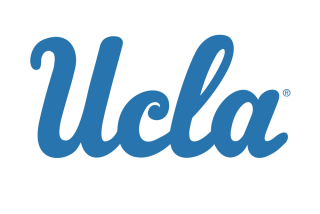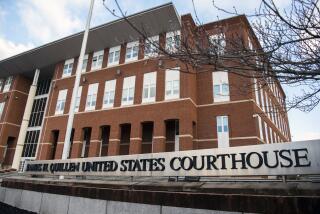More Trouble for Las Vegas
- Share via
It didn’t matter that Lamar Odom took the money and ran. It didn’t matter that Odom never played a minute at Nevada Las Vegas.
What did matter to the NCAA was that dating to 1996, UNLV broke rules in recruiting Odom. So the NCAA on Tuesday hit UNLV with four years of probation, including a ban from postseason play this season. And sixth-year coach Bill Bayno paid for the indiscretions, and other NCAA violations, with his job.
Odom, in his second season with the Clippers, issued a “no comment” through the team and his home answering machine was not accepting messages. Bayno, meanwhile, did not attend a news conference at UNLV announcing his firing.
Second-year assistant Max Good takes over as coach of the struggling Rebels, who are 3-4 after an embarrassing loss at Nevada Reno last weekend and play host to No. 17 Cincinnati on Saturday.
UNLV President Carol Harter, a frequent figure on the court during pregame introductions at Rebel home games who would kiss Bayno on the cheek on her way to her seat, kissed her former coach goodbye by saying the NCAA’s ruling warranted the dismissal.
“There is nothing more important to a university and its community than integrity,” Harter said. “We feel the NCAA’s findings in this matter justify strong action.”
At the time the violations occurred, UNLV was on probation from a 1993 ruling.
At the heart of this matter was the 1996-97 recruitment of Odom.
According to the NCAA investigation, Odom was afforded a total of $5,600 between the summer of 1996 and December 1997 by UNLV booster and Bayno friend Dr. David Chapman, a Las Vegas dentist.
“For two months during the summer of 1997, the individual provided approximately $400 to $800 two or three times a week to the prospect,” the release said. “The university made a decision on July 24, 1997, not to allow the prospect, who then was enrolled in a summer school class, to continue as a student-athlete at the university. The amount of cash the prospect received before the university severed its ties was at least $4,000.
“After the young man left the university, the representative continued to provide him with housing, automobile, meals, dental work, clothing and cash. Eventually, the amount of cash provided to the prospect was approximately $5,600.”
Odom, who bounced around three high schools his senior year, signed with UNLV in April 1997, passing over Kentucky, Connecticut and the NBA.
But after questions surrounding his relatively-high American College Test score of 22 arose in a July Sports Illustrated article, Odom refused to allow his test to be reviewed, prompting UNLV to drop Odom.
Within three weeks of his release, Odom was cited for solicitation of a prostitute by an undercover police officer in downtown Las Vegas.
Odom did not play in 1997-98 but somehow got himself eligible to play for Jim Harrick at Rhode Island in 1998-99. And after averaging 17.6 points, 9.4 rebounds and 3.8 assists, the Clippers selected him with the fourth overall pick in the 1999 NBA draft.
In pleading its case, UNLV claimed that the benefits provided Odom by Chapman occurred after Odom was released.
“When it comes to recruiting, obviously they can say they had no advantage because the guy didn’t come,” said Jack Friedenthal, the infractions committee chair. “But we can’t condone improper conduct designed to . . . entice a star athlete to come to your school. We put on penalties for making a bad attempt.”
Because of its status as a repeat violator, the NCAA penalties were harsher than expected, though the “death penalty” could have been applied under NCAA bylaws.
Other penalties against UNLV included: in 2001-02, no participation in “exempted” events, knocking the Rebels out of next year’s Preseason NIT; in 2001-02 and 2002-03, UNLV loses two scholarships, from 13 to 11; in 2001-02 and 2002-03, UNLV official visits with recruits are cut by four, from 12 to eight; and UNLV must disassociate itself from Chapman for seven years.
UNLV met with the committee Sept. 22 in Dallas and offered to self-impose sanctions, including the loss of one scholarship for a year and dropping official visits by two for the same season.
Bayno, who was hired March 30, 1995 and signed through 2003 with an annual base salary of $136,500, had seen more than 20 players leave the program before using up their eligibility. Plus, three members of his staff had left in the past 18 months--assistant Greg “Shoes” Vetrone, a former UC Irvine assistant who recruited Odom to UNLV; director of basketball operations Barry Rohrssen, who is mentioned in the NCAA report; and associate head coach Glynn Cyprien, who left this summer to take a similar position at Oklahoma State.
In recent days, Bayno, whose career record at UNLV was 94-64, drew UNLV fans’ ire by saying it was hard to recruit to Las Vegas and even downplayed the talent on his team.
Bayno, 38, has had three players reach the NBA--former Clipper and current Washington Wizard swingman Tyrone Nesby, Denver Nugget center Keon Clark and Phoenix Sun small forward Shawn Marion--and has only two first-round NCAA tournament thumpings, by Princeton in 1998 and Tulsa last spring, to show for it.
UNLV has not been ranked since the final poll of the 1992-93 season, when the J.R. Rider-led Rebels were No. 25.
As part of its self-imposed penalties, UNLV will require all first-year players to live on campus and not arrive in Las Vegas until the start of the school year, to avoid the sort of off-season tampering that was prevalent in the Odom saga.
Said Friedenthal: “We haven’t seen [UNLV] in a while. We don’t want to see them again, I’ll tell you that.”
*
Staff Writer Lonnie White contributed to this report
More to Read
Go beyond the scoreboard
Get the latest on L.A.'s teams in the daily Sports Report newsletter.
You may occasionally receive promotional content from the Los Angeles Times.









